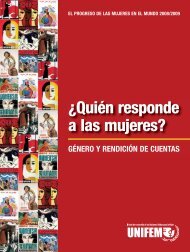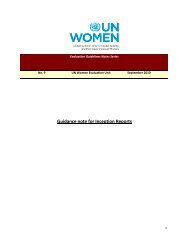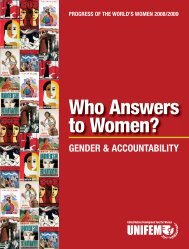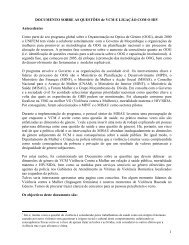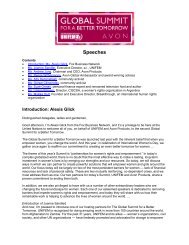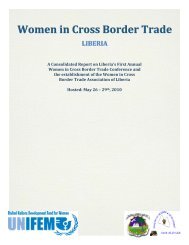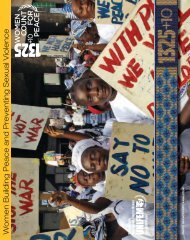You also want an ePaper? Increase the reach of your titles
YUMPU automatically turns print PDFs into web optimized ePapers that Google loves.
Références<br />
Chapitre 1 :<br />
Qui est responsable<br />
envers les femmes ?<br />
1 Schedler, A. 1999. “Conceptualizing Accountability.”<br />
In A. Schedler, L. Diamond & M. F. Plattner (Eds.), The<br />
Self-Restraining State: Power and Accountability in<br />
New Democracies. Boulder, CO: Lynne Reinner,<br />
p. 14.<br />
2 Goetz, A. M., & Jenkins, R. 2005. Reinventing Accountability:<br />
Making Democracy Work for Human<br />
Development. New York: Palgrave Macmillan, pp. 12<br />
and 48.<br />
3 O’Donnell, G. 1999. “A Response to My Commentators.”<br />
In A. Schedler, L. Diamond & M. F. Plattner<br />
(Eds.), The Self-Restraining State: Power and Accountability<br />
in New Democracies. Boulder, CO: Lynne<br />
Reinner Publishers, p. 29.<br />
4 Hirschman, A. O. 1970. Exit, Voice and Loyalty:<br />
Reponses to Decline in Firms, Organizations, and States.<br />
Cambridge, MA: Harvard University Press; voir<br />
aussi Jenkins, R. 2007. Accountability Briefi ng Note.<br />
Department for International Development, Royaume-<br />
Uni, p. 7, disponible sur demande.<br />
5 Houtzager, P. & Joshi, A. 2008. “Introduction:<br />
Contours of a Research Project and Early Findings.”<br />
Institute for Development Studies (IDS) Bulletin, 38(6),<br />
p. 1.<br />
6 Fonds de développement des Nations Unies pour la<br />
femme (<strong>UN</strong>IFEM) & Programme des Nations Unies<br />
pour le développement (<strong>UN</strong>DP). 2007. “Policy Briefi<br />
ng Paper: Gender Sensitive Police Reform in Post<br />
Confl ict Societies.” pp. 6 and 9.<br />
7 Voir encadré 2E « GABRIELA s’en va au Congrès »,<br />
au Chapitre 2.<br />
8 Les éléments de la réforme de la redevabilité énoncés<br />
ici proviennent de Goetz and Jenkins 2005,<br />
Chapitre 2.<br />
9 Voir <strong>UN</strong>IFEM. <strong>Women</strong> Targeted or Affected by Armed<br />
Confl ict: What Role for Military Peacekeepers. Exposé<br />
présenté à la Wilton Park Conference, 27-29 mai<br />
2008, Sussex, Royaume-Uni. Consulté le 24 juin<br />
2008, à http://www.unifem.org/news_events/event_<br />
detail.php?EventID=175.<br />
10 Pour la budgétisation municipale participative au<br />
Brésil, voir Abers, R. 1998. “From Clientelism to<br />
Cooperation: Local Government, Participatory Policy<br />
and Civic Organization in Porto Alegre, Brazil.” Politics<br />
and Society, 26(4), pp. 511-538. For the Federal<br />
Electoral Institute in Mexico, voir Schedler 1999, and<br />
Olvera 2003. “Movimientos Sociales Prodemocraticos,<br />
Democratizacion y Esfera Publica en Mexico: El<br />
Caso de Aliance Civica.” In A. Olvera (Ed.), Sociedad<br />
Civil, Esfera Publica y Democracia, Fondo de Cultura<br />
Economica. Mexico: Federal Electoral Institute in<br />
Mexico. Pour les comités de vigilance en Bolivie, voir<br />
Blackburn J. & Holland, J. “Who changes? Institutionalizing<br />
Participation in Development,” Intermediate<br />
Technology, Londres, 1998. Pour les conseils scolaires<br />
locaux et la police de proximité à Chicago, voir<br />
Fung, A. 2001. “Accountable Autonomy: Toward<br />
Empowered Deliberation in Chicago Schools and<br />
Policing.” Exposé présenté à la réunion annuelle de la<br />
American Political Science Association, Atlanta, 2-5<br />
septembre 2001, et pour la supervision communautaire<br />
de la police à Chicago, voir Skogan, W., & Harnett,<br />
S., 1997. Community Policing: Chicago Style.<br />
Oxford University Press, New York.<br />
11 Steinberg, D. 2008. “Beyond Victimhood: Engaging<br />
<strong>Women</strong> in the Pursuit of Peace.” Témoignage devant<br />
la Sous-commission pour les organisations internationales,<br />
les droits de l’homme et le contrôle, Commission<br />
des affaires étrangères, Chambre des députés<br />
des États-Unis. Consulté le 17 juillet 2008, à http://<br />
www.crisisgroup.org/home/index.cfm?id=5444&l=1.<br />
12 <strong>UN</strong>IFEM. “Beyond Numbers: Supporting <strong>Women</strong>’s<br />
Political Participation and Promoting Gender Equality<br />
in Post-Confl ict Governance in Africa.” A Review of<br />
the Role of the United Nations Development Fund<br />
for <strong>Women</strong>. Consulté le 26 juin 2008, à http://www.<br />
womenwarpeace.org/webfm_send/99, p. 25.<br />
13 L’expression « critique pour la mission » est employée<br />
par Jennifer Davis 2004 dans son analyse des réformes<br />
de la redevabilité et de la motivation dans le<br />
secteur de l’eau et de l’assainissement en Asie du<br />
Sud. Voir Davis, J. 2004. “Corruption in Public Service<br />
Delivery: Experience from South Asia’s Water and<br />
Sanitation Sector.” World Development, 32(1), p. 68.<br />
14 Union interparlementaire. 2008. <strong>Women</strong> in National<br />
Parliaments: Comparative Data by Country (as of 31<br />
May 2008). Consulté le 30 juin 2008, à http://www.<br />
ipu.org/wmn-e/classif.htm.<br />
15 Bureau international du Travail. 2008. “Global Employment<br />
Trends for <strong>Women</strong>.” Consulté le 30 juin<br />
2008, à http://www.ilo.org/wcmsp5/groups/public/--<br />
-dgreports/---dcomm/documents/publication/wcms_<br />
091225.pdf.<br />
16 Confédération syndicale internationale. 2008. The<br />
Global Gender Pay Gap. Consulté le 30 juin 2008, à<br />
http://www.ituc-csi.org/IMG/pdf/gap-1.pdf.<br />
17 Division de statistique des Nations Unies. 2007. MDG<br />
Report 2007. Consulté le 30 juin 2008, à http://mdgs.<br />
un.org/unsd/mdg/Resources/Static/Products/Progress2007/<strong>UN</strong>SD_MDG_Report_2007e.pdf.<br />
18 ONUSIDA et Organisation mondiale de la santé.<br />
2007. Le point sur l’épidémie de sida 2007. Consulté<br />
le 30 juin 2008, à http://data.unaids.org/pub/EPISlides/2007/2007_epiupdate_en.pdf;<br />
version française<br />
disponible à http://data.unaids.org/pub/EPISlides/2007/2007_epiupdate_fr.pdf<br />
19 Banque mondiale. 2008. World Development Indicators.<br />
Consulté le 30 juin 2008, à http://go.worldbank.<br />
org/6HAYAHG8H0.<br />
Encart : Perceptions de la corruption :<br />
le facteur genre<br />
i Transparency International. 2005. Report on the<br />
Transparency International Global Corruption Barometer<br />
2005. International Secretariat: Policy and<br />
Research Department, Transparency International.<br />
Berlin. Transparency International Corruption Perceptions<br />
Index (CPI) Database. Consultée le 30 juin 2008,<br />
à http://www.transparency.org/policy_research/surveys_indices/cpi.<br />
Encart : Rompre le silence : la redevabilité en<br />
matière d’élimination de la violence envers les<br />
femmes et les filles<br />
i Assemblée générale des Nations Unies. 2006. Étude<br />
approfondie de toutes les formes de violence à<br />
l’égard des femmes : Rapport du Secrétaire général<br />
(A/61/122/Add.1). (Dans le monde, au moins une<br />
femme sur trois a été battue, forcée d’avoir des<br />
rapports sexuels ou victime d’autres abus dans sa<br />
vie, l’auteur des faits étant généralement quelqu’un<br />
qu’elle connaît.)<br />
ii Projet Objectifs du Millénaire. 2005. Taking Action:<br />
Achieving Gender Equality and Empowering <strong>Women</strong>.<br />
Task Force on Education and Gender Equality. London<br />
and Sterling, VA: Earthscan.<br />
iii Conseil de sécurité des Nations Unies. 2008. Résolution<br />
1820. Consultée le 26 juin 2008, à http://www.<br />
un.org/Docs/sc/unsc_resolutions08.htm.<br />
iv Nations Unies. 2006. “Integration of the Human<br />
Rights of <strong>Women</strong> and the Gender Perspective: the<br />
Due Diligence Standard as a Tool for the Elimination<br />
of Violence Against <strong>Women</strong>.” Rapport du Rapporteur<br />
spécial sur la violence contre les femmes, ses causes<br />
et ses conséquences (E/CN.4/2006/61). New York :<br />
Nations Unies.<br />
v Fonds des Nations Unies pour la population (<strong>UN</strong>FPA).<br />
2005. État de la population mondiale 2005 : La<br />
promesse de l’égalité : égalité des sexes, santé en<br />
matière de procréation et objectifs du Millénaire pour<br />
le développement, p. 77 (encadré 33).<br />
vi Fonds monétaire international. 2007. “Action Plan for<br />
the Reduction of Absolute Poverty 2006-2009.” In<br />
Republic of Mozambique: Poverty Reduction Strategy<br />
Paper. Washington, D.C.<br />
vii Gouvernement de l’Afrique du Sud. 2007. HIV & AIDS<br />
and STI Strategic Plan for South Africa 2007-2011.<br />
viii Campagne du Secrétaire général des Natoins Unies.<br />
2008. “<strong>UN</strong> Secretary-General Ban Ki-moon Launches<br />
Campaign to End Violence against <strong>Women</strong>.” Press<br />
Release, à http://endviolence.un.org/press.shtml.<br />
Encadré 1A : La bonne gouvernance –<br />
Définition sensible aux sexospécificités<br />
i Santioso, C. 2001. “Good Governance and Aid<br />
Effectiveness: The World Bank and Conditionality.”<br />
The Georgetown Public Policy Review, 7(1), pp. 3-5.<br />
ii Pour une analyse détaillée des conceptions des<br />
donateurs concernant la bonne gouvernance et la<br />
gouvernance démocratique, voir Department for<br />
International Development (DFID). 2006. Eliminating<br />
World Poverty: Making Governance Work for the<br />
Poor. White Paper, 22; et OCDE/CAD. 1997. Final<br />
Report of the Ad Hoc Working Group on Participatory<br />
Development and Good Governance. Paris: OCDE.<br />
Encadré 1B : L’imihigo : adaptation d’un mécanisme<br />
de redevabilité traditionnel pour lutter contre la<br />
violence sexiste<br />
i Interview avec JP Munyandamutsa, Maire du District<br />
de Kamonyi, 25 avril 2008, Kigali, dans les dossiers<br />
d’<strong>UN</strong>IFEM.<br />
ii République de l’Ouganda, Ministère du genre, du travail<br />
et du développement social. 2005. “Community<br />
Dialogue Implementation Guide: A Reference Book<br />
for All Stakeholders for the Implementation of Community<br />
Dialogue in their Own Settings.” Guidance<br />
Document. Kampala, p. 15.<br />
Chapitre 2 : Politique<br />
1 Majtenyi, C. 24 décembre 2007. “Female Candidates<br />
in Kenya Say They Face Discrimination, Violence.”<br />
Voice of America, Nairobi. Consulté le 15 juillet 2008,<br />
à http://www.voanews.com/english/archive/2007-<br />
142 LE PROGRÈS DES FEMMES À TRAVERS LE MONDE 2008/2009



